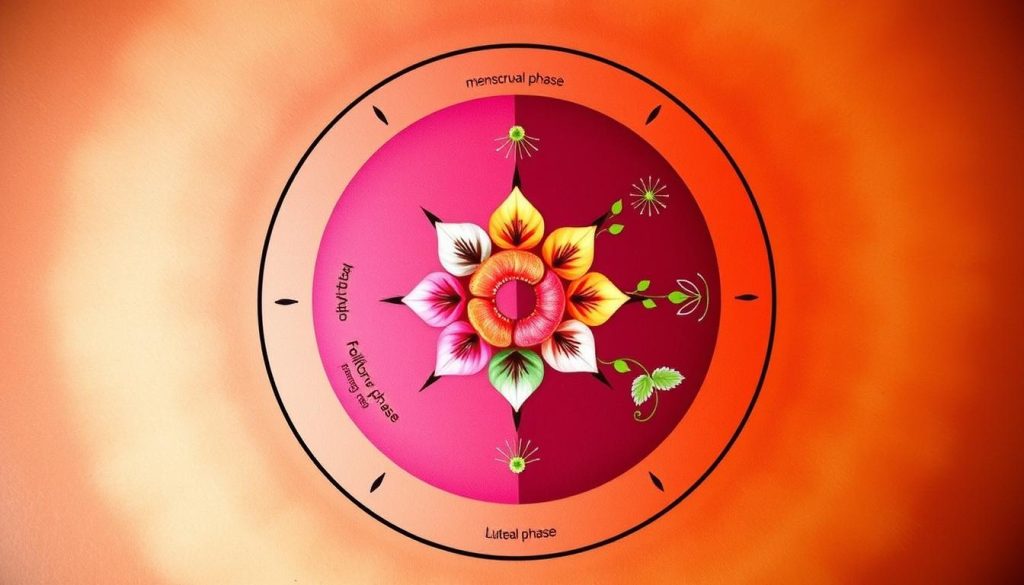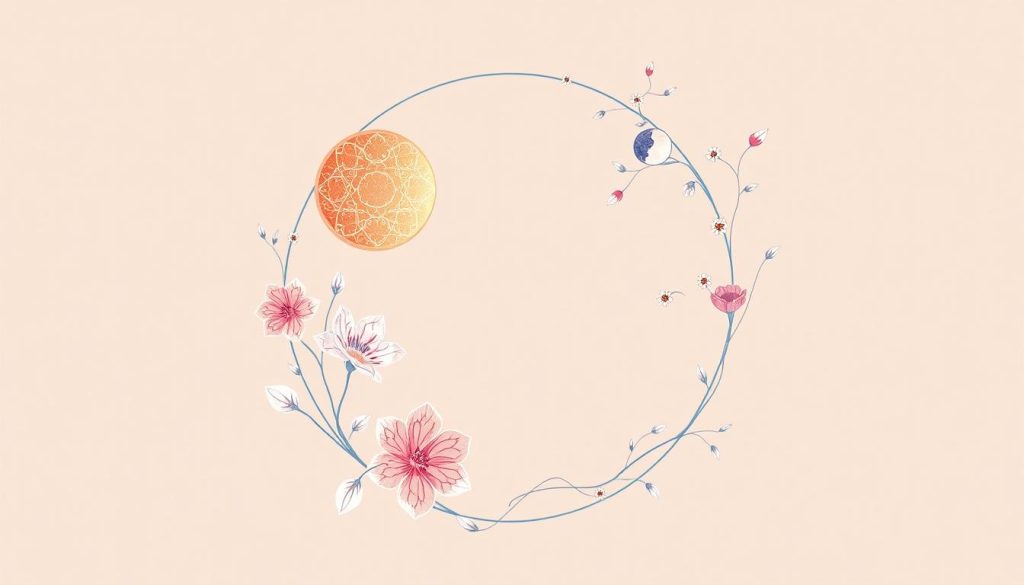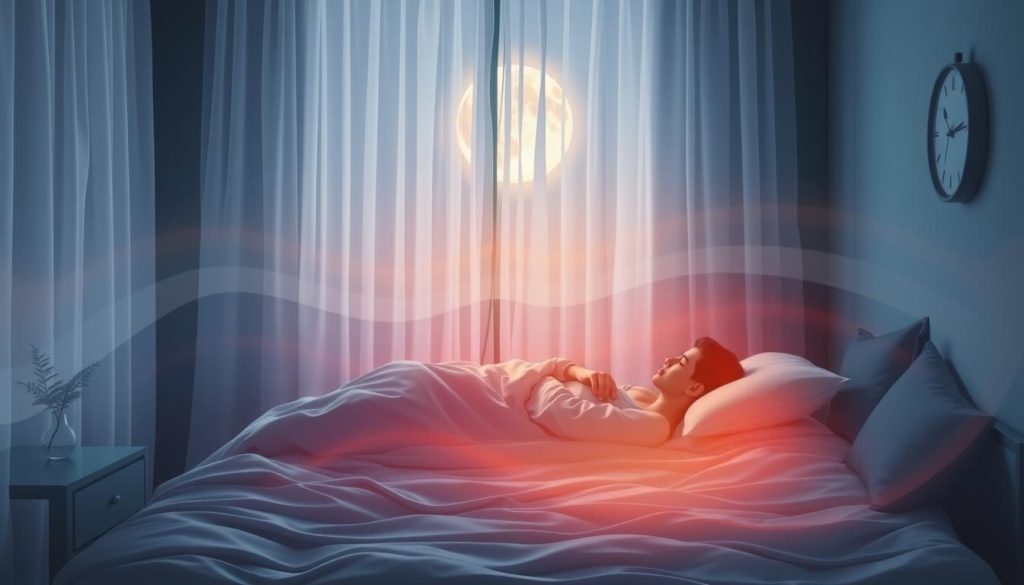I’m fascinated by how my circadian rhythm and menstrual cycle affect my health. My body’s internal clock, or circadian rhythm, controls my sleep and hormones. It helps me notice changes in mood and energy levels each month.
The menstrual cycle is linked to hormone changes that impact my sleep and health. By studying these links, I want to improve my daily life. This balance is key to managing my reproductive health and emotional well-being.
The Basics of Circadian Rhythm
The circadian rhythm is a key part of human biology. It controls our sleep-wake cycle, following a 24-hour cycle. Light and temperature play big roles in how it works. Knowing this helps us live in sync with our natural rhythms.
Understanding Circadian Rhythm
Our circadian rhythm is like an internal clock. It tells us when to be awake and when to sleep. It affects how we feel, from our mood to our energy levels.
When our rhythm matches our daily life, we do better. We’re more productive and relaxed.
How Circadian Rhythm Affects Daily Life
When our rhythm is off, it can mess up our lives. It might cause sleep problems, mood swings, and health issues. For instance, irregular sleep can make us tired or stressed.
Knowing when to do things based on our rhythm can make a big difference. It helps us live better and feel better.
| Aspect | Impact of Healthy Circadian Rhythm | Impact of Disrupted Circadian Rhythm |
|---|---|---|
| Sleep Quality | Restorative sleep | Insomnia or excessive sleepiness |
| Mood | Stable and positive | Irritability and anxiety |
| Productivity | Enhanced focus and performance | Difficulty concentrating |
| Health | Improved overall health | Increased risk of chronic diseases |
The Menstrual Cycle Explained
Learning about the menstrual cycle phases helps me understand my body better. Each phase has its own unique hormonal changes. These changes affect my mood, energy, and reproductive health. Knowing these phases helps me manage my cycle better.
Phases of the Menstrual Cycle
The menstrual cycle has four main phases:
- Menstruation: This phase starts the cycle and lasts 3 to 7 days. The uterus sheds its lining, causing bleeding.
- Follicular Phase: This phase happens at the same time as menstruation and lasts about 14 days. Follicle-stimulating hormone (FSH) helps grow ovarian follicles, getting ready for ovulation.
- Ovulation: This is the peak phase, happening around day 14. A big increase in luteinizing hormone (LH) releases an egg. This can lead to pregnancy if fertilized.
- Luteal Phase: This phase lasts about 14 days and comes after ovulation. Progesterone hormone gets the uterus ready for pregnancy. If there’s no fertilization, menstruation starts again.
Factors Influencing the Menstrual Cycle
My menstrual cycle is influenced by more than just the phases. Several factors play a role, including:
- Stress: High stress can mess with hormonal balance, causing irregularities.
- Nutrition: Eating well is key to reproductive health. Lack of nutrients can disrupt the cycle.
- Exercise: Exercise helps balance hormones. But too much can cause missed periods.
- Environmental Influences: Changes in climate or chemicals can affect the cycle.

Being aware of these phases and factors lets me take control of my reproductive health. Knowing the menstrual cycle helps me prepare and adjust my lifestyle.
Circadian Rhythm and Menstrual Cycle Insights
The link between my circadian rhythm and menstrual cycle is really interesting. It has big health effects. Studies show that hormone changes in the menstrual cycle can mess with sleep patterns. For instance, the luteal phase often brings sleep troubles, which can be tough and hurt my overall health.
It’s key to sync my circadian rhythm with my menstrual cycle for better health. By matching these natural cycles, I can boost my mental and physical health. Setting routines that fit both my sleep and hormone changes can make my life more balanced. This might help control my mood, energy, and overall health.
Knowing how these rhythms work together helps me make better daily choices. Spotting when my menstrual cycle messes with sleep lets me find ways to lessen its effect. This could mean going to bed earlier or having a relaxing bedtime routine.

The Interconnection Between Circadian Rhythm and Hormonal Changes
Learning about the link between hormones and sleep has been eye-opening. During my menstrual cycle, changes in estrogen and progesterone affect my sleep. These shifts can either help me sleep well or make it hard to rest, depending on my cycle phase.
How Hormones Affect My Sleep Patterns
In the follicular phase, rising estrogen improves my mood and sleep. Moving into the luteal phase, progesterone’s increase can disrupt my rest. Knowing these changes helps me understand my body’s sleep patterns better.
Adapting My Routine to Align with Hormonal Changes
To keep hormones in balance, adapting my routine is key. Here are some helpful strategies:
- I adjust my workouts, doing more intense ones during the follicular phase and softer ones in the luteal phase.
- I eat more complex carbs when progesterone peaks to help with mood and energy.
- I have a calming bedtime routine, like reading or gentle yoga, to fight sleep issues during hormonal changes.
By paying attention to these adjustments, I’ve seen a big improvement in my well-being.

| Phase of Menstrual Cycle | Hormonal Level Changes | Impact on Sleep Quality |
|---|---|---|
| Follicular Phase | Estrogen rises | Improved mood and sleep quality |
| Luteal Phase | Progesterone increases | Poor sleep quality, possible insomnia |
| Menstrual Phase | Hormones drop | Variable sleep quality |
Practical Tips for Synchronizing My Circadian Rhythm and Menstrual Cycle
To sync my circadian rhythm with my menstrual cycle, start with a consistent sleep schedule. Going to bed and waking up at the same time every day is key. This helps my body’s internal clock stay on track.
Light in the morning also plays a big role. It tells my body it’s time to wake up. This boosts my mood and energy for the day.
Understanding my energy levels in each menstrual phase helps me adjust my lifestyle. For example, I do more cardio in the follicular phase. In the luteal phase, I prefer yoga or stretching. These activities are great for my health.
I also focus on eating mindfully and practicing relaxation techniques. These help reduce stress and improve sleep. Eating nutritious foods that match my energy needs in each phase is important. Making these changes helps me connect with my body’s natural rhythms and improves my health.

